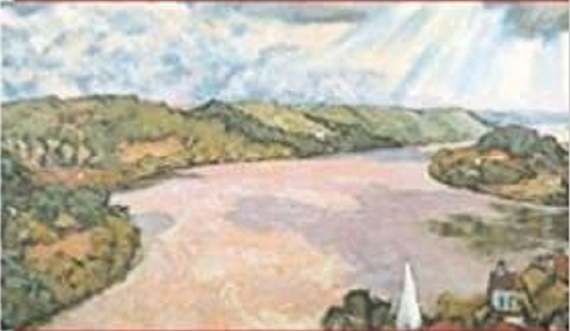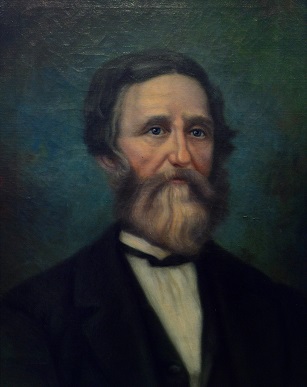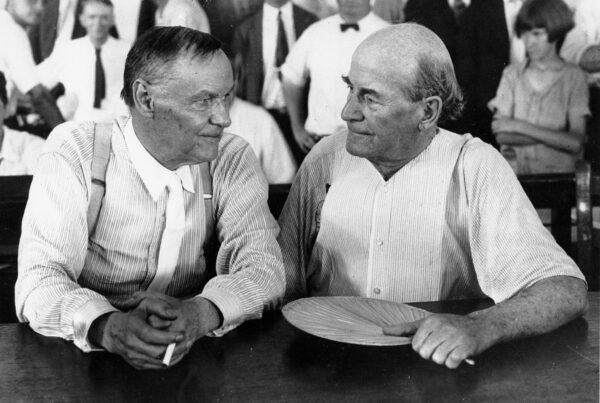
Not long after I moved my family to Bangkok, Thailand — where we lived for three years — I happened to be walking through a park with an environmental specialist for the U.S. Department of State. I noticed an interesting black bird hopping around nearby. “What’s the name of that curious bird?” I asked my friend. “Hell if I know,” he responded with a shrug. I was a bit incredulous — shouldn’t someone in his profession be cognizant of the local wildlife? (I later learned it was a common myna, ubiquitous across Thailand, in case you are interested.)
Someone else who might comment on the strange paradox of an eco-sensitive government bureaucrat ignorant of a common bird is Jayber Crow, the protagonist of the eponymous book by Kentucky poet and author Wendell Berry. “I try not to let good things go by unnoticed….. Often I fear that I am not paying enough attention,” says the barber, grave-digger and church janitor of the imaginary rural town of Port William. Living along the Kentucky River, Crow witnesses with appreciation the surrounding flora and fauna: “Everywhere I looked, the prospect was new and interesting. Nowhere I had lived before had I been so intimate with the world.”
Intimacy with one’s world is something sorely lacking in our technologically-obsessed twenty-first century, in which people pay thousands of dollars for vacations to exotic destinations far from their urban and suburban homes, take the requisite selfies while dressed in their immaculate Patagonia wardrobe, and then head to the organic, free-trade tapas bar. The technocratic, coastal elite wax eloquent on the need for Green New Deals and sustainable energy, while headphones and smartphones make them oblivious to the natural world in their immediate community. They speak of the need for a reckoning with the American past (see the 1619 Project) while embarrassingly unaware of the history of their own communities and nation.
Jayber Crow offers a better way, and it’s why I love him. Jayber, as Port William folk call him, is a man who takes time to reflect on the little piece of turf where God has placed him. He explains how he was born at the end of the age of steamboating along the rivers of Kentucky. “I would learn later that there had been other ages of the river that I had arrived too late to know but that I could read about and learn to imagine.” And so he does — the age of the American Indian, “when names were called here that have never been spoken in the present language of Port William.” This was followed by the shorter ages of European-descended whites: “the ages of the dugout, the flatboat, the keelboat, the log raft, the steamboat. And I have lived on now into the age of the diesel towboat and recreational boating and water-skiing.” I’d call that a devolution.
The barber offers love-letter portrayals of the beauty of rural, backwoods Kentucky, because he is observing and listening to it. He is quiet long enough to let it speak to him. “The woods has many doors going in and out. It is full of rooms opening into one another, shaped by directions and viewpoint. Many of these rooms are findable only once, from a certain direction on a certain day, in a certain light, at a certain time.” Jayber is a sylvan mystic, one whose meditations on the hidden beauties of nature sometimes approximate our attempts to envision heaven. Upon encountering the remains of a now overgrown homestead whose only remains are its brick remnants, he declares: “I love the house that belonged to the chimney, holding it bright in memory, and I love the saplings and the weeds.” We love the givenness of a world that we appreciate precisely because it is given, rather than something we make ourselves.
It is not just our locality that is imbued with a divinely originative beauty, but its people. Port William is populated by individuals described by Jayber with love and empathy because they are persons possessing unique worth and dignity. This is true even of its less admirable characters. “The people of the town still belonged to it economically as well as in other ways.” Those other ways derive not so much from what they can offer in some utilitarian calculus, but because they simply are. Our neighbors, like our land, are gifts to be cherished and honored.
Like nature, we form unspoken reciprocal covenants with our neighbors. “I knew that, in the midst of all the ignorance and error, this was a membership; it was the membership of Port William and of no other place on earth,” says Jayber. “I will have to share the fate of this place. Whatever happens to Port William must happen to me,” he decides. “Now I no longer went seeking, but taught myself (not always easily) to make do with the company that came.” That “making do” includes learning to frequently request and offer forgiveness; keeping faith with one’s customers, who are not anonymous walking wallets, but one’s fellow townspeople; and, upon occasion, it means indulging in the occasional backwoods moonshine party.
Yet to love something or someone risks being hurt, which is also why I hate Jayber Crow. He says that Port William will break your heart if you let it. One might say the same thing about Wendell Berry’s book. The Kentucky bard describes with incomparable affection a Southern way of life that was normative only two generations ago, but one that most millennials, to their impoverishment, would likely interpret as being just as foreign as the Civil War or Colonial era. “The young don’t come to the river anymore, even to swim or fish,” notes Jayber. “You don’t often run into them hunting in the woods. Mainly, they don’t go where they can’t drive.”
The Great Depression, two World Wars, Korea and Vietnam were hard on communities like Port William, which suffered not only poverty but the loss of many of their best men. Those who remained (or survived) were understandably eager for better times, no matter who was selling them or what the hidden costs might be. “After the Depression and the war and the years of work that they were now beginning to think of as slow and too hard, the country people were trying to get away from demanding circumstances.” But in trying to flee small-town life, what did they give up? “We couldn’t quite see at the time, or didn’t want to know, that it was the demanding circumstances that had kept us together.” What they gave up was themselves.
Technological innovation and corporate farming undermined traditional forms of agriculture and community in the name of freedom and revenue, but resulted in a new form of servitude. “The new way of farming was a way of dependence, not on land and creatures and neighbors but on machines and fuel and chemicals of all sorts, bought things, and on the sellers of bought things — which made it finally a dependence on credit.” It took less than a generation for these little farmers to “buy and borrow their way out of farming,” while “bigger and bigger farmers would be competing with their neighbors (or with doctors from the city) for the available land.” What this represented was a broader paradigmatic shift from an independent, self-reliant producer culture to a consumer culture that buys all of one’s “Made in China” necessities at the local Walmart.
Global capitalism and technological entertainment innovations had even deeper detrimental effects. It expedited life in ways that vitiated our connection to our community. Reflecting on driving his car, Jayber comments: “Even at my sedate top speed of forty miles an hour, I hated anything that required me to slow down. My mind raged and fumed and I cursed aloud at farmers driving their stock across the road, at indecisive possums, at children on bicycles.” Television in turn kept Americans indoors and away from neighbors, instead beholden to the “flickering blue light.’ And it rendered us increasingly immune to the sights and sounds of the natural world. “The people [on the river] are in an emergency to relax….. They play their radios loud enough to hear above the noise of their motors.” We silenced nature with our amplifiers.
This is a sad, if painfully accurate commentary on the transformation of rural, small-town America. For those of us who have resided, however briefly, in the long shadows of this old Southern way of life, Jayber Crow can feel like having salt thrown on an open wound. I grew up patronizing an old, community barber, Centre Barber Shop in Woodbridge, Virginia, whose owner, Al, had been the barber for my grandfather, my father, and my uncles. Al is gone now, as is most of the Southern culture of Prince William County, which has the unwelcome honor of being the first Virginia county to elect a transgender person to the House of Delegates.
I grew up in an outer Virginia suburb of Washington, D.C. that still had a few farms, one-lane bridges, and appreciable Southern accents. The last farms are gone, replaced by obnoxious mcmansions that take no account of the historical architecture of the region or blend in to their natural environs. Gone too are the one-lane bridges, which were an annoyance for commuters trying to get to the Beltway. One would likely have to go to a local nursing home to find anyone with that old, gentile Virginia cadence, given the area’s residents are largely transplants who’ve come for government jobs and the school systems, and who will likely leave upon retirement.
Jayber Crow witnesses the obsolescence and demise of a certain Southern way of life that, whatever its flaws, was still good, true, and beautiful. I see the same thing every time I drive west on Rt. 50 to visit my uncle on his property in horse country outside Middleburg, Virginia. Where once was endless acres of woods and farmland are now ugly, cookie-cutter suburban developments. Middleburg, once a quaint, rustic community most famous for being a favorite refuge for Jackie Kennedy Onassis, is little more than an extension of bourgeois Georgetown.
It’s hard not to be cynical, wondering what authentic community is possible in these exurban dystopias, when so little about them bespeaks a love of place worthy of being an inheritance to one’s descendants. “Son, you see that strip mall across the eight-lane road, next to the data center, the one with the Indian bistro and Target? Someday that will be the place that you yourself go to get take-out and buy your own electronics.” Such a future is not exactly inspiring. “I could die in peace, I think, if the world was beautiful. To know it’s being ruined is hard,” a dying, life-long resident of Port William says to Jayber. I can appreciate that sentiment.
Perhaps once one gets over the feeling of being kicked in the gut, Jayber Crow is a necessary caution and exhortation. For whatever aesthetic qualities remain in our communities, be they urban, suburban or rural, we have to work hard not only to recognize and honor them, but to preserve them and help our children to see and appreciate them, as well. Loving and losing something hurts, but isn’t it far worse to be so anaesthetized by our sundry contemporary addictions that we’re incapable of doing what makes us most fully human? Says Jayber:
It is not a terrible thing to love the world, knowing that the world is always passing and irrecoverable, to be known only in loss. To love anything good, at any cost, is a bargain. It is a terrible thing to love the world, knowing that you are a human and therefore joined by kind to all that hates the world and hurries its passing — the violence and greed and falsehood that overcome the world that is meant to be overcome by love.
We read Jayber Crow then as a charge to avoid becoming so disheartened by these desperate times that we become incapable of cherishing authentic goods that contribute to human flourishing. The white oak, its leaves reflecting light in the afternoon sun; the loud, fast chitter of the kestrel as it soars among the treetops; the family-owned business that needs your business. “There are moments when the heart is generous, and then it knows that for better or worse our lives are woven together here, one with one another and with the place and all the living things,” observes Jayber. For America to survive, we’ll need a lot more of those moments.






